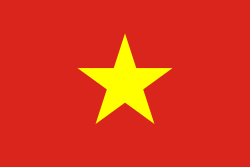
Back Korupsi di Vietnam ID การทุจริตในประเทศเวียดนาม Thai Vetnamda korrupsiya Uzbek Tham nhũng tại Việt Nam Vietnamese
Corruption in Vietnam is pervasive and widespread, due to weak legal infrastructure, financial unpredictability, and conflicting and negative bureaucratic decision-making. Surveys from 2015 revealed that while petty corruption decreased slightly throughout the country, high-level corruption significantly increased as a means of abuse of political power in Vietnam.[1] Corruption is a very significant problem in Vietnam, impacting all aspects of administration, education and law enforcement.
Vietnam is an one-party state under the Communist Party of Vietnam (CPV). In 2015, the party stated that corruption had moved up the political agenda, and the legal framework for tackling corruption had become "better developed". A major anti-corruption campaign began the next year, and by 2024, more than 2,700 party organisations and 168,000 party members were punished, including 33 current or former Central Committee members and 50 high-ranking military officers.
As of January 2018 Vietnam scored one of the highest rates of bribery practices – the rate citizens have paid a bribe to key public institutions over the past 12 months, at 65%, is second only to corruption in India with 69%.[2] In effect, as of 2012, corruption has been considered an obstacle for doing business in Vietnam, and the use of facilitation payments have been widespread when dealing with frontline civil servants at all levels of society.[3]
- ^ "Vietnam Corruption Profile". Business Anti-Corruption Portal. Archived from the original on 2 July 2015. Retrieved 2 July 2015.
- ^ Thu, Huong Le (25 January 2018). "The Vietnamese Communist Party's corruption hunt". www.lowyinstitute.org. Lowy Institute. Archived from the original on 8 July 2022. Retrieved 9 June 2022.
- ^ "Investment Climate Statement- Vietnam 2012". The US Department of State. Retrieved 25 June 2014.
© MMXXIII Rich X Search. We shall prevail. All rights reserved. Rich X Search
